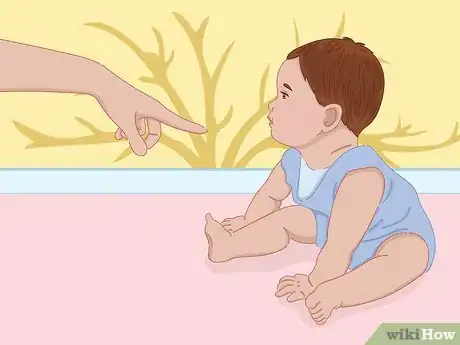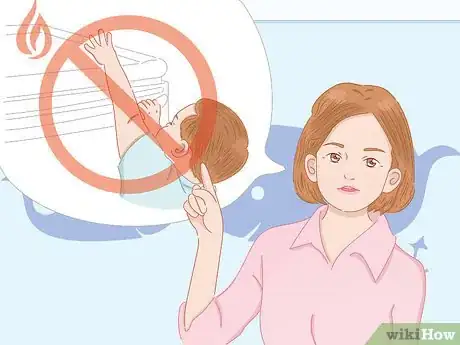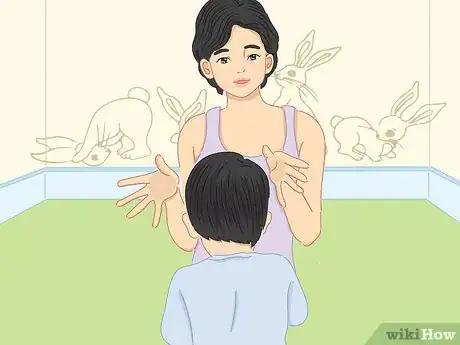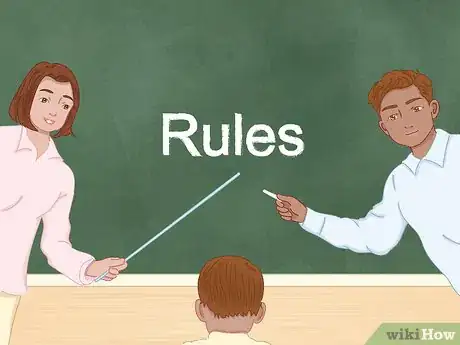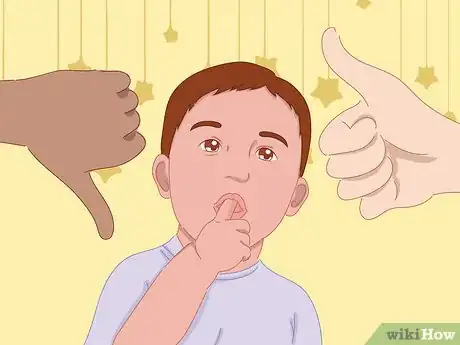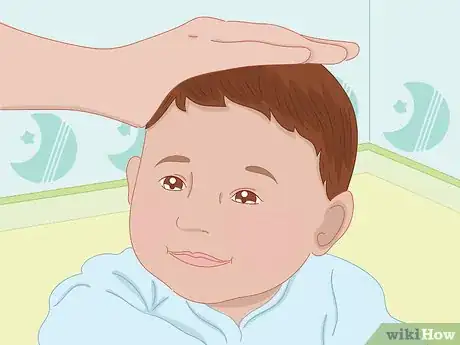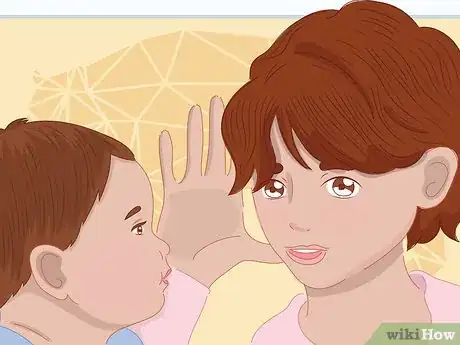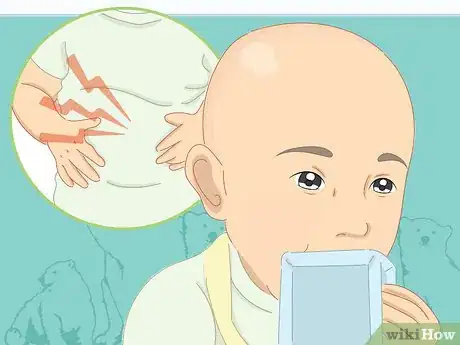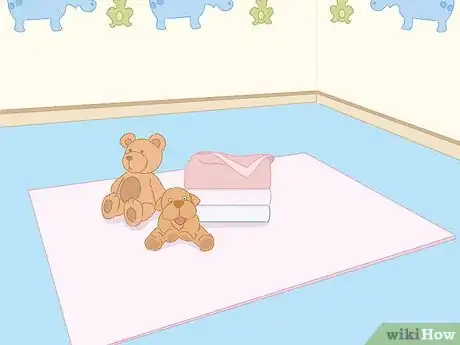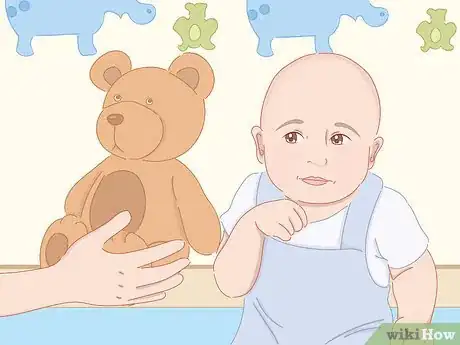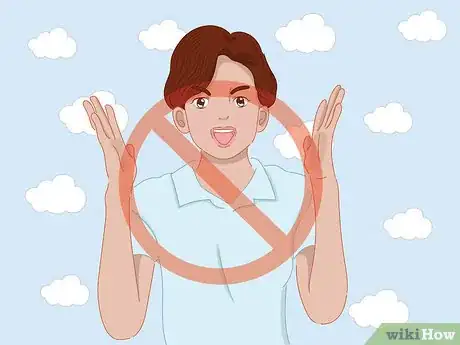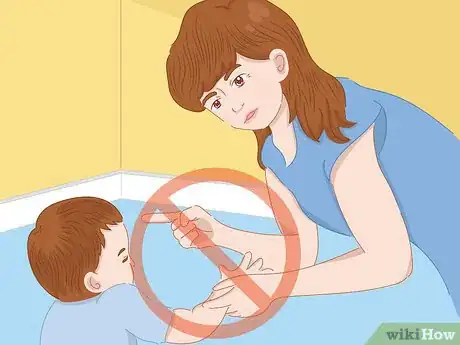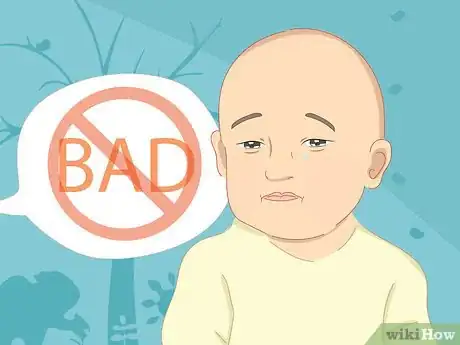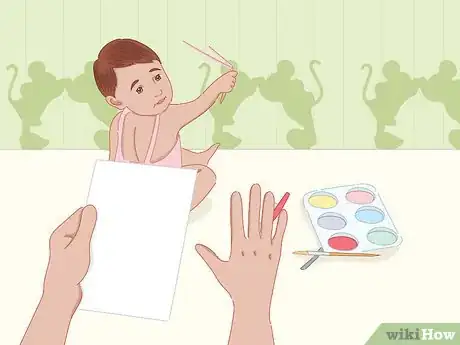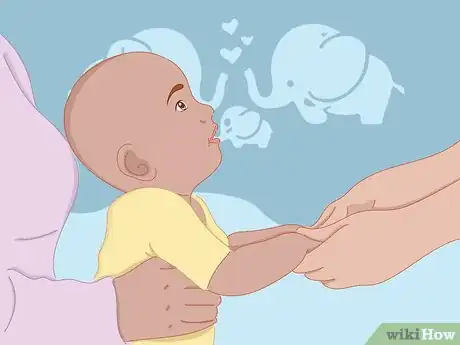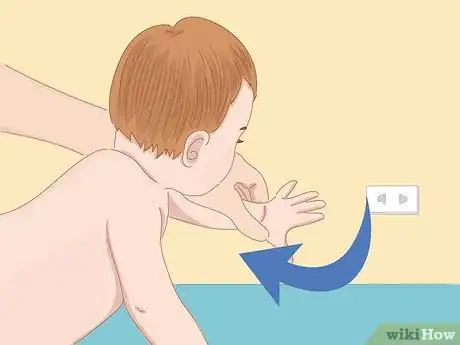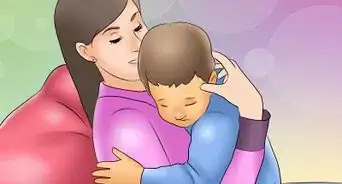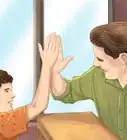This article was co-authored by Wits End Parenting and by wikiHow staff writer, Christopher M. Osborne, PhD. Wits End Parenting is a parent-coaching practice based in Berkeley, California specializing in strong-willed, “spirited” children with impulsivity, emotional volatility, difficulty “listening,” defiance, and aggression. Wits End Parenting's counselors incorporate positive discipline that is tailored to each child’s temperament while also providing long-term results, freeing parents from the need to continually re-invent their discipline strategies.
There are 9 references cited in this article, which can be found at the bottom of the page.
This article has been viewed 43,738 times.
During their second year of life, children become little explorers of their environment. They also sometimes explore the limits of your patience by touching and playing with everything they can reach. 1-year-olds are difficult to discipline because they don't really understand cause and effect. Therefore, at this tender age, discipline needs to be focused mostly on introducing rules with consequences and rewarding good behavior.
Steps
Emphasizing Good Behavior
-
1Introduce a handful of simple rules. One-year-olds will not be able to adhere to many complicated rules, so set a few simple, safety-related rules instead. Have reasonable expectations: your child is really still a baby.[1]
- It's not yet time to set rules for making the bed or keeping neat at mealtime. Instead, focus on introducing concepts like putting toys away or treating books with care.
-
2Insist on safety with your rule choices. Because a 1-year-old can only be expected to follow so many rules, you should emphasize those that relate to safety. Explain unsafe situations as they arise, and set rules. 1-year-olds can start to learn that safety-related rules are non-negotiable.[2]
- Make simple connections when you lay out the rules — “Bobby can't touch the stove like Daddy. It's hot — ouch!”
Advertisement -
3Explain the reasons behind the rules in basic terms. 1-year-olds may not be able to understand you completely, but you should still state the facts behind why something should not be done. Repeat these explanations frequently.[3]
- For instance: “We cover our mouth with our elbow when we cough so we don't share tiny yucky germs with others.”
- Or: “We don't throw blocks because they might hit Mommy or Sissy and cause an ouchie.”
-
4Aim for consistency. Your 1-year-old will not learn the rules if they vary from day to day. Stick to them consistently.[4]
- Both parents need to enforce the rules if a 1-year-old child is going to learn them. Be sure that you and your partner are on the same page. Whether or not you and the child's other parent are a couple, you will have to work diligently to ensure a consistent set of rules.
-
5Introduce consequences. It is hard to explain causes and consequences to a 1-year-old child, but now is the time to start trying. Explain positive consequences, and reward good behavior. And, in an age-appropriate way, explain the negative consequences of bad behavior.[5]
- Your tone of voice and facial expressions will tell your 1-year-old. Stay calm and keep negativity out of your voice, but be firm with them as you explain the consequences.
- “When Lucy shares her toys, it makes Lily smile and feel happy.”
- “When Hunter splashes water out of the tub, Daddy has to end bath time to clean up and we don't get to play with ducky. So sad!”
-
6Identify and praise positive behavior immediately. Young children in particular learn more from positive reinforcement than from punishment. Praise your child whenever they behave well or do something nice. 1-year-olds can learn to repeat behaviors that make their parents happy.[6]
- “You drank all your milk without spilling it. Mommy's so proud!”
- “Grammy is so happy when I see you sharing your book with your sister!”
-
7Give plenty of time and attention to your child when they are behaving well. If you only pay attention to your child when they are doing something wrong or dangerous, then they'll learn that's the only way to engage you. Spend time just learning, playing, and exploring with your child when they are behaving well.[7]
- It might be tempting to try to tidy up the room or take a moment for yourself while your kid is playing nicely with their toys, but this is a great time to shower them with attention and appreciation.
Anticipating and Avoiding Problems
-
1Observe your child's habits, preferences, and personality. 1-year-olds share many common characteristics, but every child is unique.[8] To discipline your child well, you need to understand their behavior and learn to predict their reactions. Pay attention to what your child likes and dislikes.[9]
- For instance, some kids throw an angry tantrum at the mildest correction by a parent, others sob uncontrollably, and still, others try to ignore it completely.
-
2Listen to your child. Whether your 1-year-old can use words or not, they do communicate with you. Pay attention to your child's moods and behavior, and change your approach as needed.[10]
- To communicate better with a 1-year-old, try looking into their eyes and paying attention to their signals.
- You can also teach basic sign language for babies starting at around 4 months of age, and they may be ready to start signing back at around 7 to 9 months.[11]
-
3Try to predict and meet your child's needs. It is difficult to get good behavior from any 1-year-old, but it's almost impossible if your 1-year-old is overly tired, hungry, thirsty, or nervous. Anticipate your child's needs, and you will have a better chance at seeing good behavior.[12]
- You're not at your best when you're tired, and neither is your toddler! When you see them rubbing their eyes and looking drowsy, start your naptime routine.
-
4Create a toddler-friendly environment. Remove items that should not be touched. You will be fighting a losing battle if you expect your 1-year-old to refrain from touching dozens of forbidden objects in easy reach.[13]
- Instead of repeating in vain, “Bobby can't play near Mommy's figurines. They will break and Mommy will be sad and cry,” just pack them away for a few years.
-
5Be proactive during situations that make them uncomfortable. You may notice that certain situations upset your 1-year-old and make bad behavior more likely. Avoid these situations when possible, and when there's no way to do that, try to help by bringing a favorite toy or keeping your child occupied with a song or snack.[14]
- For instance, if long car rides make your child act out during and after the ride, plan regular stops along the way and come up with some simple activities you can do together.
-
6Make consistency your ideal and choose your battles judiciously. Consistent discipline is important, but you also have to accept the reality of living with a 1-year-old. Be consistent with safety-related rules, but accept that you do not always have to “win” with other things. A little food on your child's clothes or on the floor won't hurt anything and neither will a cookie or a piece of candy from time to time.[15]
- Basically, do your best to avoid “caving in” or bypassing the rules on a regular basis, but don't beat yourself up when you inevitably do so from time to time. Nobody's perfect!
Addressing Bad Behavior Thoughtfully
-
1Keep your cool when addressing bad behavior. No matter how frustrated you become, breathe deeply and stay calm. Children are better prepared to hear what you say if you are calm and rational.[16]
- Take some deep breaths, count backward from 10 (or 50!), and visualize a peaceful scene before you address the problem.
-
2Refrain from yelling. 1-year-olds do not understand cause and effect well, and yelling will only frighten and upset them. Your child will learn to be afraid of you instead of learning how to behave.[17]
- You want to administer discipline as soon as possible so that they connect it to the specific improper behavior. Still, if you need, take a moment or two to center yourself so that you can address your child in the best way possible – calmly and rationally. Shouting is never appropriate and will seldom have a positive effect, so if you find that you are raising your voice, disengage and let the teaching moment pass. There will be plenty more.
-
3Avoid physical discipline, especially with small kids. Evidence continues to mount that physical punishments like spanking are ineffective and may in fact contribute to future anti-social behaviors. Physical punishment is particularly unhelpful for very young children, since they cannot truly yet connect the effect (the pain of your discipline) with the cause (their bad behavior).[18]
- "My parents spanked me and I turned out fine" is not a good rationale. You probably also rode in the car without a car seat, and may have ridden your bike without a helmet.
-
4Do not call your child “bad.” Highlight good behavior, and, when it is necessary to call your child's attention to bad behavior, make it a point not to call your child “bad.” 1-year-olds are just learning how the world works. They are not “bad” – they just don't know better.[19]
- Instead of “Bad Jeremy! Don't hit Daddy!”, try “It hurts Daddy when Bobby hits me — ouch!”
-
5Use “no” sparingly. For the word “no” to have maximum impact, reserve it for times when it is really necessary — for example, if your child is doing something dangerous. Otherwise, take care to frame your sentence as a positive: say, “Color on the paper!” rather than “No! Don't color on the wall!”[20]
- Rather than “No food on the floor!”, go with “Let's keep our food on our tray.”
-
6Teach your child how to interact with other people. Children can begin to learn, at this stage, that their behavior affects other people. For example, a 1-year-old child can learn, with repetition, that throwing food makes you angry. Explain these dynamics as often as needed, in a calm tone.[21]
- “Sissy gets sad and doesn't want to play with you when you take toys from her.”
- “When you bite Mommy, it means I have to stop playing blocks with you.”
-
7Offer alternatives when bad behavior is imminent. If your child is about to touch something they shouldn't or is exhibiting early signs of other bad behavior, offer a distracting alternative. 1-year-olds are easily distracted with safe and interesting toys. Follow up with discipline only if the unwanted behavior persists in spite of your attempt to divert it.[22]
Expert Q&A
-
QuestionWhy can i be good to give a child chores when they get older?
 Wits End ParentingWits End Parenting is a parent-coaching practice based in Berkeley, California specializing in strong-willed, “spirited” children with impulsivity, emotional volatility, difficulty “listening,” defiance, and aggression. Wits End Parenting's counselors incorporate positive discipline that is tailored to each child’s temperament while also providing long-term results, freeing parents from the need to continually re-invent their discipline strategies.
Wits End ParentingWits End Parenting is a parent-coaching practice based in Berkeley, California specializing in strong-willed, “spirited” children with impulsivity, emotional volatility, difficulty “listening,” defiance, and aggression. Wits End Parenting's counselors incorporate positive discipline that is tailored to each child’s temperament while also providing long-term results, freeing parents from the need to continually re-invent their discipline strategies.
Parenting Specialists A few chores can help contribute to the feeling of group cohesion in your family, and this can make your child feel important. Chores can also create self-confidence. These executive skills are really important for children, and chores will help your child obtain them. So with a lot of kids, you can do the normal thing like give a chore chart, give them a star, they do their job, and you can call it a day. But a lot of kids don't respond to that stuff. They need the chores to be integrated into daily life. And the parent attitude's toward the chores has to be positive.
A few chores can help contribute to the feeling of group cohesion in your family, and this can make your child feel important. Chores can also create self-confidence. These executive skills are really important for children, and chores will help your child obtain them. So with a lot of kids, you can do the normal thing like give a chore chart, give them a star, they do their job, and you can call it a day. But a lot of kids don't respond to that stuff. They need the chores to be integrated into daily life. And the parent attitude's toward the chores has to be positive.
References
- ↑ https://www.familyeducation.com/life/toddler-behavior-discipline/your-one-year-old-beginning-discipline
- ↑ https://www.askdrsears.com/topics/parenting/discipline-behavior/8-tools-toddler-discipline
- ↑ https://www.parents.com/toddlers-preschoolers/discipline/tips/secrets-to-toddler-discipline/
- ↑ Wits End Parenting. Parenting Specialists. Expert Interview. 5 March 2020.
- ↑ https://www.youtube.com/watch?v=54PHW2kLydM&feature=youtu.be
- ↑ https://www.parents.com/toddlers-preschoolers/discipline/tips/secrets-to-toddler-discipline/
- ↑ https://www.parents.com/toddlers-preschoolers/discipline/tips/secrets-to-toddler-discipline/
- ↑ Wits End Parenting. Parenting Specialists. Expert Interview. 5 March 2020.
- ↑ https://www.askdrsears.com/topics/parenting/discipline-behavior/8-tools-toddler-discipline
- ↑ https://www.askdrsears.com/topics/parenting/discipline-behavior/8-tools-toddler-discipline
- ↑ https://www.parenting.com/gallery/baby-sign-language-words-to-know
- ↑ https://www.parents.com/toddlers-preschoolers/development/behavioral/when-does-discipline-begin/
- ↑ https://www.familyeducation.com/life/toddler-behavior-discipline/your-one-year-old-beginning-discipline
- ↑ https://www.parents.com/toddlers-preschoolers/development/behavioral/when-does-discipline-begin/
- ↑ https://www.babycenter.com/404_whats-the-best-way-to-discipline-a-toddler_6895.bc
- ↑ https://www.youtube.com/watch?v=54PHW2kLydM&feature=youtu.be
- ↑ https://www.youtube.com/watch?v=54PHW2kLydM&feature=youtu.be
- ↑ http://www.apa.org/monitor/2012/04/spanking.aspx
- ↑ https://www.parents.com/toddlers-preschoolers/discipline/tips/secrets-to-toddler-discipline/
- ↑ https://www.parents.com/toddlers-preschoolers/discipline/tips/secrets-to-toddler-discipline/
- ↑ https://www.parents.com/toddlers-preschoolers/discipline/tips/secrets-to-toddler-discipline/
- ↑ https://www.familyeducation.com/life/toddler-behavior-discipline/your-one-year-old-beginning-discipline
